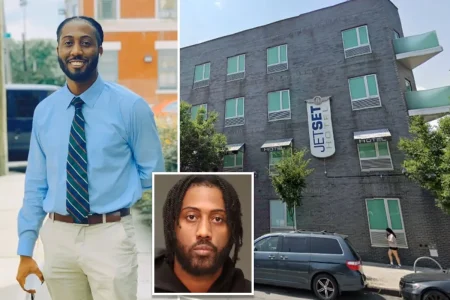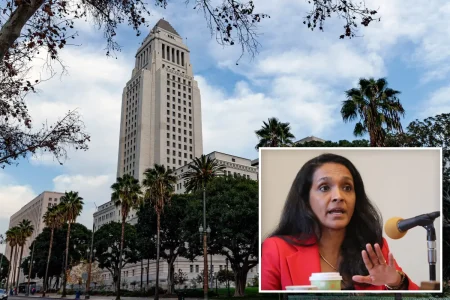A Mother’s Stand: How Dijana Hrka Became the Symbol of Justice in Serbia’s Railway Tragedy
From Personal Grief to National Movement: The Hunger Strike That Captivated a Nation
In the cold November air of Belgrade, a mother’s determined silhouette became the unexpected epicenter of a national reckoning. Dijana Hrka, whose son perished along with 15 others in a catastrophic railway station collapse, transformed her immeasurable grief into an unwavering demand for accountability through a hunger strike that would last 16 grueling days. What began as one woman’s desperate quest for answers evolved into a powerful symbol that galvanized thousands across Serbia, challenging a political establishment long criticized for its opacity and reluctance to hold powerful figures accountable.
The tragedy struck without warning on that fateful afternoon when the aging infrastructure of one of Belgrade’s busiest transit hubs gave way, burying commuters under tons of concrete and twisted metal. Among the victims was Hrka’s son, a 23-year-old university student whose future was extinguished in an instant. “My child was not collateral damage in someone’s pursuit of profit,” Hrka stated during the early days of her protest, her voice steady despite her weakening physical state. “This was not an accident but negligence, and those responsible must face justice.” Government officials initially characterized the collapse as an unfortunate structural failure that couldn’t have been foreseen, but investigative journalists soon unearthed documentation indicating that safety concerns had been repeatedly flagged and systematically ignored. Multiple inspection reports had warned of critical structural vulnerabilities, yet renovation contracts were awarded to companies with questionable qualifications and political connections.
The Human Cost of Systemic Failure
The human dimension of the tragedy extended far beyond statistics. The sixteen lives lost represented a cross-section of Serbian society: students rushing to classes, workers heading home to families, elderly pensioners making their weekly journeys. “Each person who died had a name, dreams, and people who loved them,” Hrka reminded the growing crowds during the candlelight vigils that became nightly occurrences outside the presidential administration building. Her hunger strike began almost spontaneously, when, after receiving what she described as “bureaucratic platitudes” instead of answers during a meeting with transportation ministry officials, she sat down on the concrete steps of the government complex and announced she would not eat until those responsible were named and arrested.
Medical professionals who monitored her condition grew increasingly alarmed as days stretched into weeks. By the tenth day, Hrka had lost significant weight, and doctors warned of potential organ damage. Yet each medical recommendation to end the strike was met with the same quiet determination that had become her hallmark. “My son no longer has a voice,” she told supporters who urged her to consider her health. “I am his voice now, and I will not be silenced by my own discomfort when families like mine deserve truth.” Her steadfastness resonated deeply in a society where many feel powerless against entrenched systems of influence. Every evening, the crowd surrounding her grew larger—first hundreds, then thousands of citizens from diverse backgrounds united in solidarity with a mother’s quest for justice. Social media amplified her message beyond Belgrade, with hashtags like #JusticeForDijana and #AccountabilityNow trending across platforms and bringing international attention to both the tragedy and the subsequent governmental response.
When One Voice Becomes Many: The Growing Movement
What distinguished Hrka’s protest from previous anti-government demonstrations was its remarkable ability to transcend traditional political divisions. Opposition politicians who attempted to co-opt the movement for their own purposes found themselves politely but firmly sidelined. “This is not about left or right,” Hrka insisted during an impromptu press conference on her twelfth day without food. “This is about basic human dignity and the right of citizens to expect safety in public spaces.” Her approach struck a chord with Serbians tired of partisan rhetoric and hungry for authentic leadership centered on core values rather than political expediency. Ordinary citizens began organizing support systems—providing blankets during cold nights, setting up weather protection, and maintaining a continuous presence to ensure her safety.
The government’s response evolved from dismissive indifference to increasingly desperate attempts at damage control. Initial statements suggesting that Hrka was being “manipulated by opposition forces” backfired spectacularly when journalists uncovered her previously apolitical background as a pediatric nurse with decades of community service. A subsequent offer of a private meeting with mid-level officials was similarly rejected as insufficient. “I do not seek special treatment,” she explained. “I seek public accountability for a public tragedy.” By the second week, international human rights organizations began issuing statements of concern, and foreign embassies in Belgrade quietly pressed for resolution. The pressure intensified when a coalition of civil engineers and architects published an independent analysis confirming that the collapse had been entirely preventable and directly linked to substandard materials and inspection failures.
Breakthrough and Reckoning
The breakthrough came on the sixteenth day, when prosecutors announced criminal negligence charges against three high-ranking transportation officials and the CEO of the primary construction contractor. In an unprecedented move, the investigation was expanded to include the government minister who had overseen the railway station renovation project. A visibly exhausted but resolute Hrka accepted a glass of juice from her doctor, symbolically ending her hunger strike as cameras captured the moment. “This is not the end, but the beginning of our journey toward justice,” she told the assembled crowd, her voice hoarse but unwavering. “Today, Serbia has shown that the powerful cannot hide behind their positions when lives are lost through their negligence.”
The aftermath of Hrka’s protest has catalyzed a broader national conversation about infrastructure safety, corruption, and governmental accountability. Civil society organizations report unprecedented public engagement in monitoring public works projects, while legal reforms to strengthen building codes and inspection protocols have been fast-tracked through parliament. For Hrka herself, the personal cost of becoming a reluctant public figure remains immense. “I would trade all of this—every headline, every reform, every moment of impact—to have my son back for just one minute,” she confided during a rare personal interview months after the protest. “But since that’s impossible, I can only ensure that his death forces the change that might save someone else’s child.” Her remarkable journey from private grief to public advocacy illuminates how a single individual’s moral courage can penetrate the barriers of indifference and institutional resistance. In a political landscape often characterized by cynicism, Dijana Hrka’s sixteen days without food nourished something desperately needed in Serbian society: the belief that ordinary citizens can still hold the powerful accountable, and that justice, while imperfect and delayed, remains possible for those with the courage to demand it.







